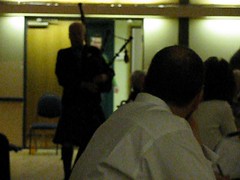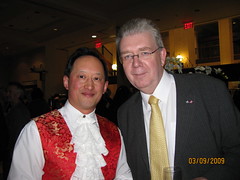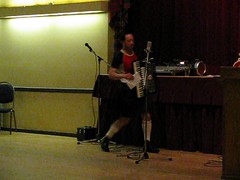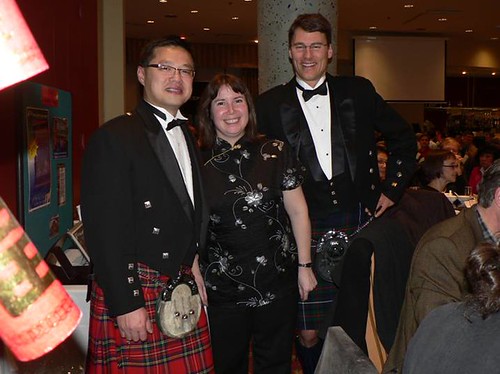April 6th is Tartan Day the whole world over. And now there is Scottish Week.
The Centre for Scottish Studies, at Simon Fraser University, organized a conference on “Robert Burns in Transatlantic Context.” I was invited by Dr. Leith Davis to perform on the Tuesday evening, and give a presentation on Wednesday afternoon, and attend the closing reception on Thursday evening.
Tartan Week in Vancouver was also the final stop for Scottish Parliamentary Minister of Culture, Michael Russell, who started his week at the Tartan Day parade in New York City, visited Toronto, Vancouver, Victoria, then Vancouver again.
Toddish McWong meets Michael Russell, Scottish Parliamentary Minister for Culture, External Affairs and Constitution,
Scottish Development International – photo T. Wong
Last year I was featured in a Vancouver Sun story about Tartan Day. Vancouver Sun: The next celebration – Toddish McWong helps to spread the word about Tartan Day
Then I helped organize a proclamation by the City of Vancouver:
Tartan Day (April 6) proclaimed in City of Vancouver, April 3
A Tartan Day dragon boat paddle practice… with bagpiper and proclamation reading
This year the major events were organized by Dr. Leith Davis, director of the Centre for Scottish Studies, SFU.
The week started out with a Tuesday evening of music and song for the “Musical Celebration of Burns in North America,” featuring Jon Bartlett and Rika Reubsaat, performing “Burns Songs in BC”, and also Kirsteen McCue and pianist David Hamilton performing Burns Songs by Serge Hovey. This was really interesting because Kirsteen is from Scotland, and she explained that these were the musical arrangements that Burns himself had used, but were only discovered a few years ago.
The third set of the evening featured Gung Haggis Fat Choy performers. After a poem by visiting Scottish professor Dr. Robert Crawford, Dr. Jan Walls explained about Chinese clapper songs. Jan is former director of International Communication at SFU, and also a former cultural attache for the Canadian embassy in Beijing. At this year's Gung Haggis Fat Choy dinner, Jan performed a song about Robbie Burns to chinese clappers. Leith was knocked out by Jan's performance. This evening Jan performed the Burns poem “John Barleycorn.”
Leith's idea was to introduce all the travelling Burns scholars and conference attendees to a little bit of Gung Haggis Fat Choy. She told them all that it was the “best Burns dinner” she has been to. And she was amazed at how the Gung Haggis event incorporated and promoted cultural fusion.
Leith asked for a performance of “The Haggis Rap” or “Rap To A Haggis”, in which bagpiper Joe McDonald and I rap the immortal Burns poem, “Address to a Haggis.” I introduced it by saying that Joe and I had performed this on CBC national television, and our MP3 version had also been played on BBC Radio Scotland two years ago. Meanwhile, Joe had found a haggis in the kitchen. Gung Haggis dragon boater Debbie Poon followed Joe into the hall carrying the haggis.
 Joe McDonald pipes in the haggis for Scottish Week.
Joe McDonald pipes in the haggis for Scottish Week.
We closed off the evening by leading a singalong of Auld Lang Syne with the first verse and chorus in Mandarin Chinese. Then dragon boaters Steven Wong and Debbie Poon helped lead some “volunteers” in a Chinese dragon parade, complete with two children carrying the Chinese lion masks. It was fun, and lots of people thanked us afterwards with positive compliments.
On Wednesday there was a Community Research Forum on “Burns In BC.”
Jon Bartlett and Rika Reubsaat started the forum by talking about the history of Burns dinners in BC. They were followed by Robert Barr who gave a history of the Vancouver Burns Club. I followed with a history of Gung Haggis Fat Choy, its origins and its cultural fusion context.
I explained that BC is a young province. While we are celebrating the 250th Anniversary of Robert Burns' birth, we only just celebrated the 150th anniversary of the colony of BC. Vancouver is only 123 years old. I explained that to me, the “Two Solitudes” of BC are the Scottish and Chinese. Each arrived from an opposite direction, and lived in conflict. I explained that if the Scots hadn't been in political power, there probably wouldn't have been a Chinese Head Tax or an Exclusion Act to keep the Chinese out of Canada. To which many people applauded my statement. I went on to say that many generations later, there are many Scots and Chinese intermarried, and sharing Scots and Chinese DNA, just like in my family.
I shared how I first wore a kilt for the 1993 Burns ceremony at Simon Fraser University, and how the Gung Haggis Fat Choy dinners grew from 16 people in 1998 to 550 people in 2009. A CBC television performance special was aired in 2004 and 2005. And with the SFU Recreation Department, I helped create the SFU Gung Haggis Fat Choy Festival in 2005 with dragon cart races, and later with the human curling event. It was a good talk that also included how I was chosent to play Robert Burns for the Celticfest's inaugural “Battle of the Bards” which I won against actors playing Dylan Thomas and W.B. Yeats.
Making Burns relevant in a global 21st Century, is what Gung Haggis Fat Choy events do. The growth of copycat dinners in Ottawa, the Yukon, Seattle and Santa Barbara, demonstrate that Gung Haggis is reaching people in a positive way. While promoting Burns, it also addresses multiculturalism and racism.
Thursday's Scottish Week finale is a reception for Michael Russell, Scottish Member of Parliament.


 Todd Wong apologizes for being unable to “roll” his “r's” due to Chinese DNA which has no “r-sounds”in the Chinese language.
Todd Wong apologizes for being unable to “roll” his “r's” due to Chinese DNA which has no “r-sounds”in the Chinese language.


 Joe McDonald “raps” and slices the haggis
Joe McDonald “raps” and slices the haggis



























